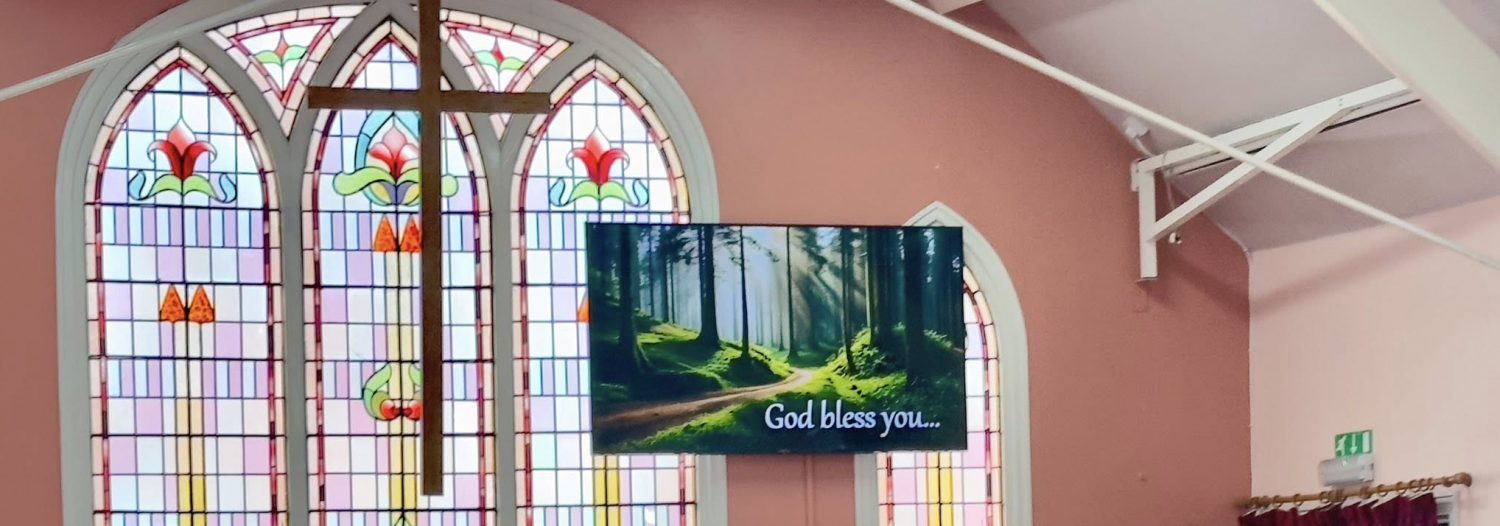May the LORD bless you and keep you
Luke 24:50 “he lifted up his hands and blessed them”
On a Sunday evening at the end of June I found myself in St John’s Chapel, Worcester Cathedral after being granted the huge privilege of praying with a group of 11 ordinands most of whom had trained at the Queen’s Foundation, Birmingham in the moments before they went out to be ordained.
Two unexpected things occurred. First was that no one had warned me that the chapel was next to the organ pipes so that I could hardly hear myself think never mind pray! Someone unkindly suggested I had been chosen for the task because I was the loudest person they could think of!
Second unexpected thing was that one ordinand had come dashing in at the last minute immaculately dressed in a grey cassock and clerical shirt but no collar – it was a very hot day. 1,700 folks had been present at the reception into Full Connexion in Wolverhampton in the morning – glorious but warm and somewhere along she had lost her clerical collar.
There was no hesitation on my part – I immediately whipped out my own collar from my shirt and inserted it into the tunnel collar of her shirt and we had a hug and exchanged a kiss. The ordinand was Julia Monaghan – so not just a former Queen student but my own successor at Lyndon. So Julia was ordained wearing my clerical collar. Hole punch.
This is not a story about the wearing of clerical dress or about bits of plastic but about something much more. It’s about the gifts we pass onto each other. Julia is doing an absolutely brilliant job at Lyndon caring for people I too have cared for and I give thanks to God for who she is – in that moment as I gave her my collar I realised I was giving more – it was a moment of blessing and of seeing and knowing each other as gift.
My theme for today which departs from the lectionary: what do we pass on to each other and to the world for the sake of the Kingdom? Do we/can we give the blessing that God gives us through Jesus? Can we create circles of blessing which will ripple out in increasingly wide circles that will touch more and more lives and draw more and more people into the circle of blessing this Church community has the potential to be?
The ending of Luke’s gospel seems to be a deliberate parallel with its opening where the infant Jesus is blessed in the temple by Simeon. In this final contact between Jesus and his disciples Luke uses the word blessing three times in as many sentences. Thus Jesus’ last action is to bless his friends and his last words to them is one of blessing.
Now if I were to sneeze loudly what would you say to me? Swine flu outbreaks may have altered this to –have you disposed of your handkerchief safely – but I hope the answer is:
Bless you!
Do we know why we do that?
Possibly because sneezing was thought to be a sign of the plague – so God Bless you was a real prayer of protection for the sneezer.
Possibly because sneezing was a sign of the devil coming out of you so the prayer God bless you was a protective shield so that the devil didn’t get you.
Bless you has entered popular culture now but been reduced to bless!
However what I want to concentrate on this morning is the significance of Jesus’ parting action being one of blessing and the disciples response to Jesus’ blessing of them is to go to the temple and praise and bless God.
Jesus’s parting action is one of intentional and deliberate blessing. In this action he is conveying to his friends for the last time what he knows of the love and grace of God – what he has experienced of God uniquely as the son of God. He does not cling to that experience, that knowledge, it is not private – he shares it, he passes it on.
What I want to remind us is that he blesses them in their imperfections. He does not bless them because they’re good enough to be blessed. He blesses them in their imperfections not because they are perfect – these are the ones who have doubted and betrayed, runaway , this is the lot who denied him, who hid behind closed doors because they were afraid………
These are the ones who are blessed by Jesus and who he trusts with the mission of God in and for the world.
The psalm we read together is another reminder to us that we are loved in our imperfections, in our unformed, yet to grow and mature selves. In our partial and incomplete selves we are known and loved and blessed by God. The Psalm is a vivid reminder through the metaphor of the yet to be fully formed child in the womb.
I am stunned to see the quality of scan photographs proud grandparents show me of their yet to be born grand-children but the metaphor is powerful in our spiritual development too.
None of us now are the people we can become – we are still learning, still growing, still unformed, still potential,
Much of our human lives can be spent getting it wrong – hurting each other, ourselves and God.
We are loved by God as individuals and as a church not in our perfection, but in our imperfection, while we were yet sinners Christ died for us Paul knowingly declares.
We are faced with a choice. In Alan Bennett’s play The History Boys a very flawed human being called Hector who loves literature has a rallying cry about the love of English literature he tries to instill in his pupils – pass it on boys, pass it on…
What do we want to pass on to others? What is it we want to share with our community and neighbourhood?
When you’re in the queue at Tesco, at work, at home, in Church Council, in House groups?
I ask the question because it is possible to get caught up in vicious circles – someone hurts us we want to hurt them back….
There can be an almighty gulf between what we profess and what we do and say and are. We need to re-discover that capacity for blessing one another with love and grace and seeing one another as gift and as grace.
A story to finish with. In the splendid novel Gilead Marilynne Robinson writes of a en elderly pastor John Broughton remembering an occasion when he was young and he saw a couple walking down the street…
Broughton says – we need to see the world as full of blessing. Water can be used for watering the vegetable patch or washing the dishes in – but it is also the water of baptism, a sign of blessing and God’s grace reaching to each and to all.
How do we see the world, each other, this community – I invite you to see it as full of blessing, full of those in whom we see and receive God’s grace, his love, his blessing..
And give thanks to God.
Amen

